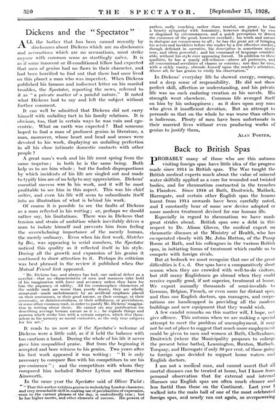Dickens and the ".Spectator"
ALL the bother that has been caused recently by disclosures about Dickens which are no disclosures and accusations which are no 'accusations, must strike anyone with common sense as startlingly naïVe. It is as if some innocent or ill-conditioned fellow had expected that men of genius had no flaws in their character, and had been horrified to find out that there had once lived on this planet a man who was imperfect. When Dickens published his famous and indiscreet letter on his marital troubles, the Spectator, reporting the news, referred to it as " a private matter of a painful nature." It noted what Dickens had to say and left the subject without further comment.
It can well be admitted that Dickens did not carry himself with unfailing tact in his family relations, It is obvious, too, that in certain ways he was vain and ego- centric. What on earth was expected ? Had someone hoped to find a man of profusest genius in literature, a man, moreover, whose heart and head and senses were devoted to his work, displaying an unfailing perfection in all his close intimate domestic contacts with other people ?
A great man's work and his life must spring from the same impetus ; in both he is the same being. Both help us to see him whole ; but the foolish disproportions by which incidents of his life are singled out and made to typify him are of no help to any appreciation. Dickens' essential success was in his work, and it will be most profitable to see him in this aspect. This was his chief tatier, and even his life will seem to subordinate itself into an illustration of what is behind his work.
Of course it is possible to see the faults of Dickens as a man reflected in his writing ; or, perhaps we should rather say, his limitations. There was in Dickens that tension and strain of ambition which inevitably drives a man to isolate himself and prevents him from feeling the overwhelming importance of the merely human, the merely ordinary. Even when his first work, Sketches by Be:, was appearing in serial numbers, the Spectator noticed this quality as it reflected itself in his style. During all the growth and expansion of his genius it continued to draw attention to it. Perhaps its criticism was best phrased in the review it published when Our Mutual Friend first appeared.
" Mr. Dickens has, and always has had, one radical defect as a novelist—that no characteristics of men and manners take hold of his imagination with force and accuracy unless they have for him the piquancy of oddity. All his commonplace characters of the middle rank are worse than poorly drawn, they are wholly unnatural—made melodramatic by an artificial emphasis placed on their sentiments, or their good nature, or their courage, or their generosity, or disinterestedness, or their selfishness, or peevishness, or some other common trait, in order to justify Mr. Dickens' imagina- tion in writing about them. He cannot see any justification for describing average human nature as it r. ; he regards things and persons which strike him with a certain surprise, which dint them- • selves in his memory as moral curiosities, as the only true subjects for his art."
It reads to us now as if the Spectator's welcome of Dickens were a little cold, as if it held the balance with too cautious a hand. During the whole of his life it never . gave him unqualified praise. But from the beginning it accepted and bore witness to his genius. Two years after his first work appeared it was writing : " It is only necessary to compare Boz with his competitors to see his pre-eminence " ; and the competitors with whom they compared him included Bulwer Lytton and Harrison Ainsworth.
In the same year the Spectator said of Oliver Twist: " That this author exhibits genius in embodying London character, and very remarkable skill in nutking use of peculiarities of expression, -even to the current phrases of the day, is undoubtedly true ; but he has higher merits, and other elements of success. His powers of pathos, sadly touching rather than tearful, are great ; he has a hearty sympathy with hiuninity, however degraded by vice or disguised by circumstances, and a quick perception to detect the existence of the good, however overlaid ; his truth and nature in dialogue are conspicuous to all ; he has the great art of _bringing his actors and incidents before the reader by a few effective strokes; though deficient in narrative, his description is sometimes nicely true, and often powerful ; and his command of language consider. able, without his style ever appearing forced. IR addition to these qualities, he has a manly self-reliance—above all pretences, and all conventional servilities of classes or coteries; nor does he ever, with a sickly vanity, obtrude himself upon the reader's attention. Above all, he has genius to vivify his observation."
In Dickens' everyday life he showed energy, courage, and a deep sense of responsibility. He did not show perfect skill, affection or understanding, and his private life was no such enduring creation as his novels. His strength went elsewhere. Common life avenged itself on him by his unhappiness ; as it does upon any man who gives it insufficient devotion. But an attempt to persuade us that on the whole he was worse than others is ludicrous. Plenty of men have been unfortunate in their married lives without even producing works of genius to justify them, ALAN PORTER.






































 Previous page
Previous page